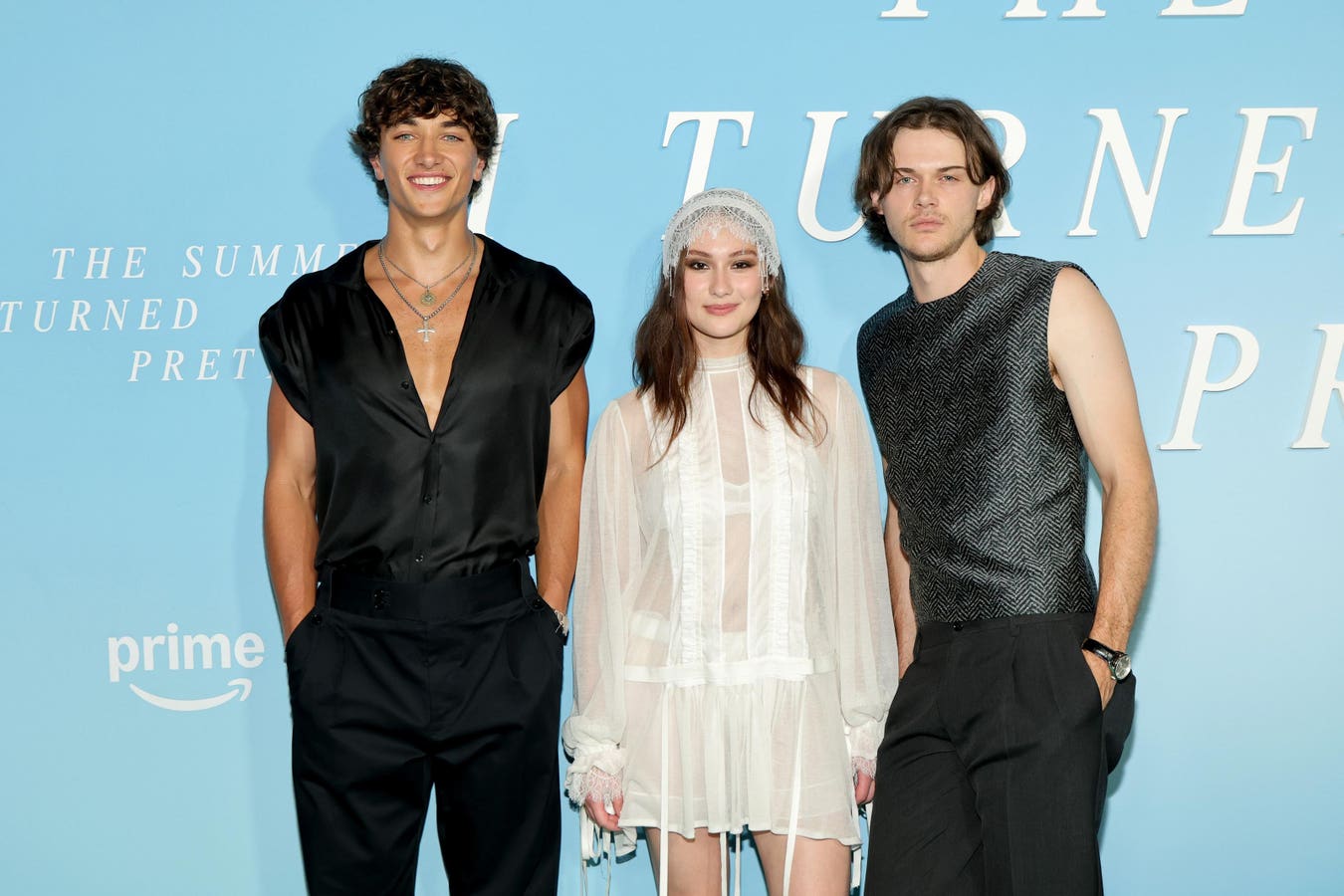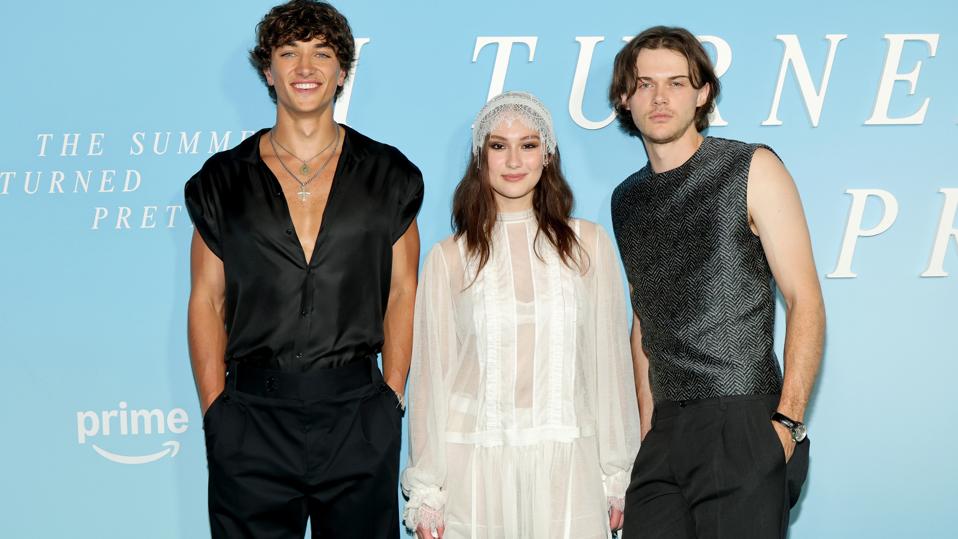Team Conrad or Team Jeremiah? The Summer I Turned Pretty takes you through a chaotic summer that you wish you had, in a story that starts to feel strangely personal.
WireImage
With its finale approaching, The Summer I Turned Pretty has gone from just another teen romance to a global obsession, sparking debates that feel more personal than fictional.
If you’ve been online this summer, it’s almost impossible to have escaped the mania surrounding the show. From TikTok clips to Instagram reels and YouTube, fans are dissecting every romantic entanglement in the show.
And, if you mention to a fan that you’ve started watching the series, chances are the first question you’ll usually hear is, “Are you Team Jeremiah or Team Conrad?” — a sign of how invested people get in the characters’ romantic journeys. The show’s viewers find themselves inexplicably drawn into this drama of a fictional teen summer and watch the characters grow into young adults in season three.
The third and final season debuted on July 16, 2025, raking in 25 million viewers globally on Amazon Prime in its first seven days. Season three viewership was up by 40% in this timeframe compared to Season two. What’s even more impressive is that the series viewership tripled from Season one to Season three in the same seven-day window.
Thousands of TikTok videos and YouTube clips focus on Belly, played by Lola Tung, the show’s protagonist, with some fans feeling protective of her journey, and others fans simultaneously mocking her decisions and questioning her romantic choices.
Yet the same viewers can’t stop watching, and eagerly anticipate the next episode. Many have been dedicated fans since the beginning, while others are diving in purely out of a fear of missing out, not wanting to be left out of trending discussions.
The phenomenon has even caught the attention of relationship experts, who are now weighing in on what it says about viewers’ personalities and attachment styles when they align themselves with Team Conrad or Team Jeremiah.
In short, while the series is a compelling form of entertainment, for many, it also seems to be mirroring their own emotional lives and relationship aspirations.
Here are three reasons why so many people are obsessed with this show.
1. It Helps You Escape Into An Idealized Self
Part of the reason The Summer I Turned Pretty resonates so widely is because it allows viewers to project themselves into a more romantic and idealized version of adolescence. One filled with beach houses, lifelong friendships and the kind of love triangles many never experienced in reality.
Research published in Self and Identity explored narrative transportation and parasocial relationships. Researchers found that when audiences are deeply absorbed in a story, two psychological processes can occur.
The first is cognitive overlap, where viewers see parts of their actual selves in a character. The second is the perceived self-expansion. This means the character represents the viewer’s ideal self. This allows you to step into an aspirational life through fiction. In other words, the story doesn’t just reflect who you are but also gives you a space to explore who you wish you could have been.
These processes help explain why the show’s pull feels so strong. For some, Belly’s awkwardness and indecision mirror their own teenage selves.
The narrative also presents a fantasy scenario that many viewers secretly crave. The idea about being the center of attention for two seemingly perfect and attractive love interests is an experience many enjoy daydreaming about.
Belly’s indecision between Conrad, played by Christopher Briney and Jeremiah, played by Gavin Casalegno, offers an almost cinematic version of desire that fans can mentally enjoy.
For many viewers, imagining themselves as Belly isn’t just about following her story. It’s also about feeling seen and desired in a way that’s rare for many in real life.
This dynamic also taps into a universal fantasy, which is the thrill of being loved in contrasting ways. Conrad embodies the archetype of intense and brooding depth with all the emotional highs. On the other hand, Jeremiah represents a lighthearted charm.
So, for viewers, it’s a playful exploration of romantic idealism and a chance to experience the emotional stakes of love without real-world consequences.
2. It Makes You Long For Summers You Never Had
A powerful sense of nostalgia might be one big reason for audiences being so hooked on the show. The show offers a window into an idealized version of youth. It feels both familiar as well as longed-for. This is true even for viewers who never experienced similar situations.
A 2018 study published in Poetics examined how nostalgia operates as part of media use. Researchers found that media-triggered nostalgia serves multiple functions. Firstly, it strengthens a sense of identity by linking past and present that is self-oriented. Secondly, it provides meaning and coherence to life experiences and it also creates connections with others who share similar memories.
Taken together, this highlights how nostalgia contributes to hedonic enjoyment and non-hedonic experiences that eventually enhance psychological well-being.
Essentially, nostalgia makes you feel good in the moment because it’s pleasurable. So when you watch The Summer I Turned Pretty, it can make you feel excited or relive fun memories of summers past. These are immediate and emotional pleasures.
At the same time, nostalgia provides deeper and less obvious benefits. It can help you reflect on your personal growth and make sense of your life experiences. These are meaningful and reflective experiences rather than just momentary feelings of enjoyment.
When you watch the show with friends, discussing favorite moments or participating in online fan communities, it allows you to feel a shared sense of belonging. This makes it a collective experience where personal memories help create a comforting bridge between self and society.
In a way, this show gives the viewers a chance to collectively reimagine their teenage summers or romances they once had, or wished for, in a way that feels personally and socially meaningful.
The series can feel like a collective daydream. Viewers may project themselves into Belly’s world because it represents a heightened version of theirs. The late-night bonfires and melodramatic love triangles can provide a universal prompt for a “what if” fantasy. It’s possible you find yourself thinking, “What if my teen years had been this thrilling, this romantic, this cinematic?”
The show gives both younger and older audiences a sense of participation in an idealized adolescence, either reliving it or experiencing it vicariously for the first time.
3. Relatability With The Complexity Of The Characters
One important way the show manages to grip audiences is with the parasocial relationships they form through it. Viewers aren’t just watching Belly, Conrad and Jeremiah; rather, they’re often relating to them as if they were part of their own lives. The intensity of the online “Team Conrad” versus “Team Jeremiah” debates highlights how real these connections can feel.
A 2023 study published in Psychology of Popular Media backs this phenomenon. The study included 200 participants. The researchers found that individuals with higher attachment anxiety, that is people who crave closeness but fear abandonment, reported stronger parasocial relationships with their favorite TV characters.
This link was explained by belongingness needs. Anxiously attached individuals turned to media figures to fulfill emotional needs that were unmet in their real lives.
For many, the obsession with the show goes deeper than lighthearted escapism.
The show manages to give its main characters emotional depth that makes them feel strikingly real. They are layered with contradictions in many ways; kind yet flawed, strong yet vulnerable and confident yet uncertain. This complexity mirrors those found in real-life relationships.
Viewers get to see so much of themselves in the characters’ journeys, making them more relatable. Jeremiah’s warmth and dependability may symbolically meet the desire for safety and emotional security. Conrad, with his romantic intensity and loyalty, shows the magnetic pull of a first love that feels unforgettable. Belly, with her flaws and indecision, reflects the awkward but deeply human process of figuring oneself out.
Does watching the show ever make you blur the lines between reality and fiction? Take this quick science-backed test to see how deep your fandom runs for your favorite celebrities: Celebrity Attitude Scale









